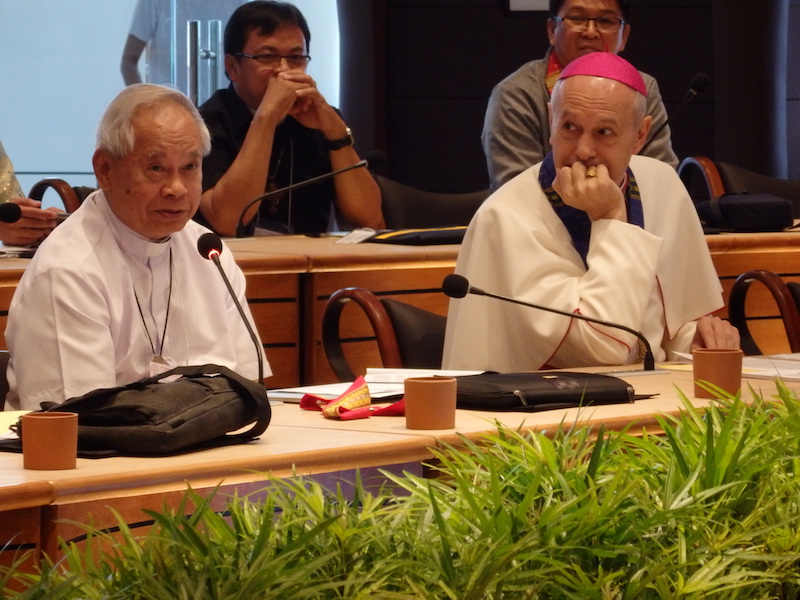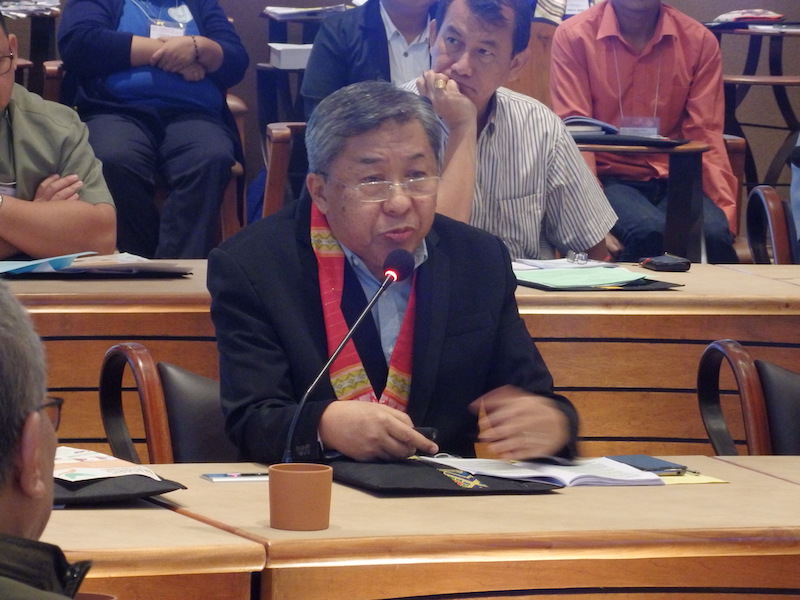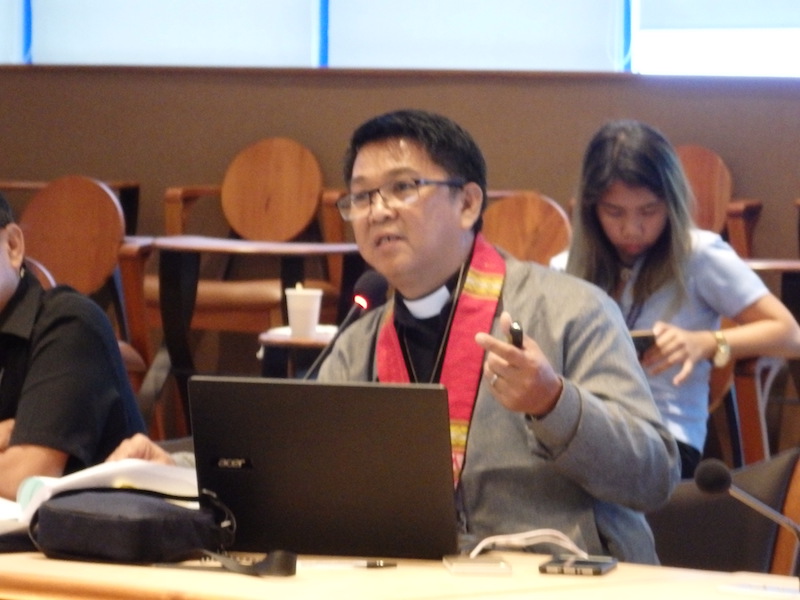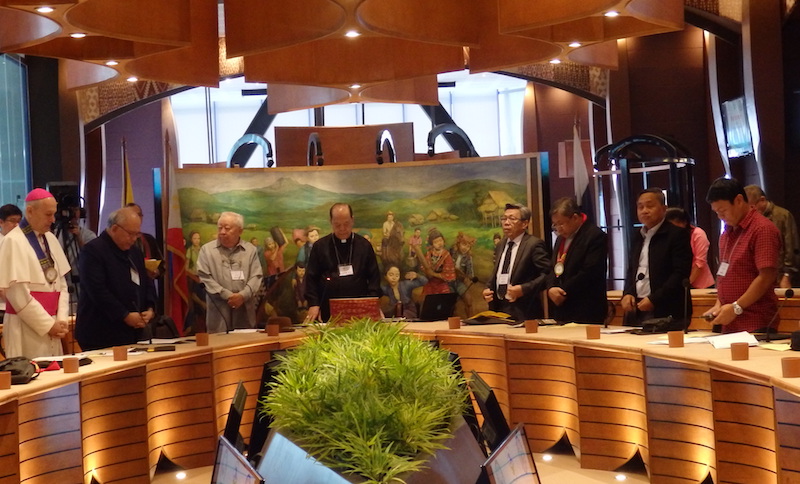DAVAO CITY (MindaNews / 02 December) — The Organic Law for the Bangsamoro Autonomous Region in Muslim Mindanao is a “win-win proposition” for peace in Mindanao and the entire country as it addresses the historical injustices as well as the aspirations of the Moro people for an autonomous region and at the same time affirms the sovereignty and territorial integrity of the Philippines, the Bishops-Ulama Conference (BUC) said.
In its statement issued at the end of the 45th General Assembly on Tuesday on the theme, “Bangsamoro Organic Law: Lights and Shadows,” the BUC described RA 11054 or the Organic Law for the Bangsamoro Autonomous Region in Muslim Mindanao as the “result of an extended dialogue through earlier agreements and peace negotiations.”
Mindanao’s lone Cardinal, Orlando Quevedo, representing Catholics; Dr. Hamid Barra,
 Archbishop Gabriele Caccia (R), Papal Nuncio to the Philppines, listens intently as Mindanao’s lone Cardinal, Orlando B. Quevedo, OMI, briefs the 45th General Assembly of the BIshops-Ulama Conference on the Organic Law for the Bangsamoro Autonomous Region in Muslim MIndanao, from the Catholic perspective, on 27 November 2018. MindaNews photo by CAROLYN O. ARGUILLAS
Archbishop Gabriele Caccia (R), Papal Nuncio to the Philppines, listens intently as Mindanao’s lone Cardinal, Orlando B. Quevedo, OMI, briefs the 45th General Assembly of the BIshops-Ulama Conference on the Organic Law for the Bangsamoro Autonomous Region in Muslim MIndanao, from the Catholic perspective, on 27 November 2018. MindaNews photo by CAROLYN O. ARGUILLAS
representing Muslims; and Reverend Johnny Labasan, representing Protestants were the lead discussants on the conversation on the Bangsamoro law’s “lights and shadows” at the San Pedro Calungsod and San Vitores Center of the Ateneo de Davao University here, while the Papal Nuncio to the Philippines, Archbishop Gabriele Caccia, delivered a special message.
Quevedo explained that RA 11054 is a “win-win proposition” as it addresses historical injustices committed against the Moro people and recognizes their historic aspiration for self-determination in their territory. On the other hand, he said, the government also wins as the law recognizes the territorial integrity of the country and its sovereignty.
Barra noted how Muslims had been living in fear and resentment for decades as government policies led to their marginalization and minoritization, that among these fears were being alienated from their religion, displaced from their ancestral homes, having no future in this country, losing cherished values, customs and practices.
Identity
The Bangsamoro law, he said, recognizes their distinct identity as Bangsamoro, as well as their territory and form of government, within the Philippines.
 Dr. Hamid Barra talks about the Bangsamoro law from the perspective of Muslims during the 45th General Assembly of the BIshops-Ulama Conference on 27 November 2018 at the Ateneo de Davao University. MIndaNews phot by CAROLYN O. ARGUILLAS
Dr. Hamid Barra talks about the Bangsamoro law from the perspective of Muslims during the 45th General Assembly of the BIshops-Ulama Conference on 27 November 2018 at the Ateneo de Davao University. MIndaNews phot by CAROLYN O. ARGUILLAS
“To us, identity is very important,” Barra said, adding that where in the past they consider ‘gobierno a sarwang’ (alien government) the governance systems imposed on them, “with this (Bangsamoro law), we are now part of government, we have identity but still part of the Philippines.”
Labasan admitted that initially, it was “not easy for us” to decide on the Bangsamoro law because their constituents expressed so many concerns. But these concerns were included in the 17-point Christian Settlers Peace and Development Agenda “for a meaningful participation of the Christian minority” to the Bangsamoro “as well as to affirm and strengthen positive factors and processes that are already in place.”
 Reverend Johnny Labasan, representing Protestants, discusses the 17-point Christian Settlers Peace and Development Agenda “for a meaningful participation of the Christian minority” to the Bangsamoro. MindaNews photo by CAROLYN O. ARGUILLAS
Reverend Johnny Labasan, representing Protestants, discusses the 17-point Christian Settlers Peace and Development Agenda “for a meaningful participation of the Christian minority” to the Bangsamoro. MindaNews photo by CAROLYN O. ARGUILLAS
The document was presented to the Moro Islamic Liberation Front (MILF) during the Moro-Christian Leaders’ Peace Dialogue in Davao City on September 28 and 29.
Lasting peace
The Papal Nuncio expressed hope that the Bangsamoro law would bring “lasting peace.”
“I wish to express my solidarity with you, Bishops and Ulama in Mindanao who are very much immersed in the reality of the people in this region, especially those who will be directly affected by this Organic Law,” Caccia said.
He expressed hope that the Bangsamoro law “will truly ensure lasting peace in Mindanao and in the whole country, so as not to repeat the painful events experienced in Marawi, the tragic effects of which continue to affect the poorest in the province.”
The Papal Nuncio cited the “Declaration on the Relation of the Church to Non-Christian Religions” proclaimed by Pope Paul VI in 1965 and how this document has influenced much of the work on inter-religious dialogue.”
He summed this up into three pillars which the BUC included in their statement: “we all belong to one human family; we are all gifted with a sense of spirituality; we all share responsibility for the common good.” (see other story)
Fears and uncertainties
The BUC statement acknowledged the “fears and insecurities” expressed by minority communities in the proposed core territory of the future Bangsamoro Autonomous Region in Muslim Mindanao about possible abuses but t added that “these anxieties are however offset by the clear provisions in the law” such as guaranteeing the bill of rights for every resident, Moro or non-Moro, to property, and freedom of religion.
The 22-year old BUC noted that the Indigenous Peoples Rights Act (IPRA) is “explicitly safeguarded” for the IPs living in the proposed core territory. As for the fears of Christians that the Sharia’h Law will apply to them, it will apply only to Muslims, the BUC said.
The bishops and ulama acknowledged that the “continuing challenge” for religious leaders and the communities is the “transformation of our own values to work for a just and sustainable peace in Mindanao.”
The BUC also said it will be the residents of the envisioned Bangsamoro who would “answer the questions regarding the selection of their members in parliament and to assure that the general welfare prevails over individual interests.”
 The 45th General Assembly of the Bishops-Ulama Conference at the Ateneo de Davao University on 27 Nov. 2018 discussed the “lights and shadows” of the Organic Law for the Autonomous Region in Muslim Mindanao. MindaNews photo by CAROLYN O. ARGUILLAS
The 45th General Assembly of the Bishops-Ulama Conference at the Ateneo de Davao University on 27 Nov. 2018 discussed the “lights and shadows” of the Organic Law for the Autonomous Region in Muslim Mindanao. MindaNews photo by CAROLYN O. ARGUILLAS
RA 11054, the enabling law of the Comprehensive Agreement on the Bangsamoro (CAB) that government and the Moro Islamic Liberation Front (MILF) signed on March 27, 2014, is set to pave the way for the creation of a new autonomous political entity called the Bangsamoro Autonomosu Region in Muslim Mindanao that will replace the 28-year old Autonomous Region in Muslim Mindanao (ARMM).
The Bangsamoro law will be subjected to ratification by the people in the proposed core territory during the plebiscite on January 21, 2019. Once ratified, the ARMM is deemed abolished and the three-year transition begins with the appointment of an 80-member Bangsamoro Transition Authority (BTA) that will govern the Bangsamoro until the first set of officials elected in May 2022 assumes their post on June 30, 2022 on the inauguration of the Bangsamoro government.
The BUC also expressed hope that during the transition period, the Transition Road Map would be characterized by the theme of this year’s Mindanao Week of Peace: “Peace Through Dialogue: Our Destiny.”
“As peace is our destiny, we pray that Muslims, Christians, and Lumad join hands, hearts, and souls for the success of the BOL as our hope for a just and lasting peace in Mindanao,” the BUC said. (Carolyn O. Arguillas / MindaNews)
